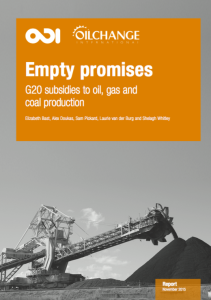Empty promises: G20 subsidies to oil, gas and coal production
November 2015
Oil Change International and Overseas Development Institute
DOWNLOAD EXECUTIVE SUMMARY
DOWNLOAD FULL REPORT
COUNTRY STUDIES: Argentina, Australia, Brazil, Canada, China, France, Germany, India, Indonesia, Italy, Japan, Korea, Mexico, Russia, Saudi Arabia, South Africa, Turkey, United Kingdom, United States
Empty promises: Appendix 2 data base (.xls)
G20 country governments are providing $444 billion a year in subsidies for the production of fossil fuels. Their continued support for fossil fuel production marries bad economics with potentially disastrous consequences for the climate. In effect, governments are propping up the production of oil, gas and coal, most of which can never be used if the world is to avoid dangerous climate change. It is tantamount to G20 governments allowing fossil fuel producers to undermine national climate commitments, while paying them for the privilege.
This report documents, for the first time, the scale and structure of fossil fuel production subsidies in the G20 countries. The evidence points to a publicly financed bailout for some of the world’s largest, most carbon-intensive and polluting companies.
The analysis of subsidies presented in this report is consistent with the definition of subsidies provided by the World Trade Organization (WTO) that has been agreed by 153 countries. For the purpose of this report we identify three types of fossil fuel production subsidies:
- national subsidies delivered through direct spending and tax breaks of $70 billion
- investments by majority state-owned enterprises (SOEs) that account for another $286 billion
- public finance from majority government-owned banks and financial institutions that amounts to another $88 billion per year on average in 2013 and 2014.
Governments in the G20 and beyond should act immediately to phase-out subsidies to fossil fuel production.
People around the world are joining together to demand world leaders #StopFundingFossils. Join the movement: http://stopfundingfossils.org/
Map of subsidies:

